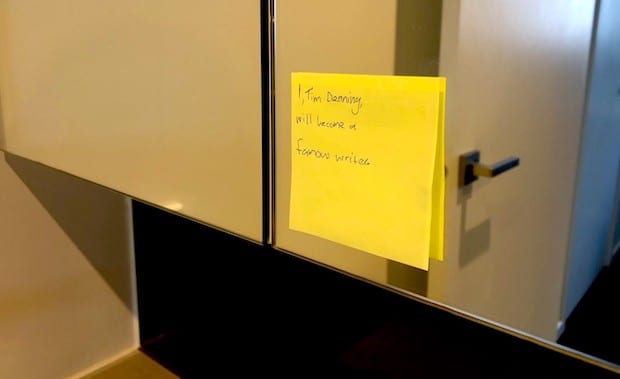Life
After Tragedy: 4 Thoughts To Consider

Last week was a tragic day for people that live in Melbourne, Australia. Lives were lost, and families were torn apart. We were reminded of just how close we can all come to death. Negativity struck again amongst a week filled with so much joy.
Everyone in Melbourne, including me, felt their heart sink as we rang our loved ones to make sure they were okay; as we desperately wanted to hear their voices.
As I texted my friends while gunshots happened close by, I was reminded of the terror that we can all face in nothing more than a split second. I said goodbye to an important client and had no idea that they were walking onto the street where terror was underway.
I thought to myself, as the event unfolded, “What if that’s the last time I see them? What if I had only spoken to them a bit longer rather than being in such a hurry to get to my next meeting?” Thankfully they were okay, but you never know.
My own mortality started to come into question. I too, like my client, was just about to step onto the street where people were being struck, and lives were being lost. If it weren’t for a colleague who stopped me in the corridor to chat, I would have been crossing the street at the exact moment that this devastating event unfolded.
Standing in the lobby, I saw many of my work colleagues run past me crying. They looked like they had just seen the most horrific event of their life – and they had. Amongst the madness of yesterday there are lessons to be learned
After tragedy, here are 4 thoughts to consider:
Thought #1 – We’re guaranteed only of this moment
An event like the one I’ve just described can happen at any time. None of us are guaranteed another breath. Tragedy is not designed to scare us; it’s designed to remind us of how important it is to be present.
We’re only on this planet for a blink of an eye in the grand scheme of things, and we forget that so easily.
Thought # 2 – Perspective is crucial
Instead of rushing out the door and being in a hurry to get to work, be grateful and tell your family how much you love them. Don’t forget how lucky you are even to have loved ones to care for.
A sense of perspective in your life is crucial. The person that cut you off in traffic or the one who went two minutes over in a meeting room you had booked, doesn’t really matter. Reacting to everything that comes into your line of vision will destroy your energy levels and force you to lose perspective.
Refocus your newfound energy from non-reactivity into energy that can be used to enhance the time with the people you really care about. Tragic events can remind us of what we should focus on, but it’s not enough and can be easily forgotten when the sadness subsides.
Thought # 3 – Don’t let this negative world win
What happened yesterday is a one-off incident. Every other day there are people getting married, babies being born, people realizsing their passion, and new lovers sharing a first kiss. This negative world and these one-off horrors can get you down if you let it.
We can decide to live in fear because of a few isolated, negative events, or we can rise up. We can become what we’ve always dreamt of and use these tragic events as fuel to our fire. We can stop procrastinating on what we should be doing and get on with our life’s purpose.
There’s so much good in the world. It’s just that the light doesn’t get shown on all of this positivity because it’s in overwhelming abundance. Negative events like the one above are actually very rare.
Anything that is rare is more likely to gain attention. Attention equals influence, and influence equals a powerful tool that can be used for the wrong reasons. I’ve always believed that attention and influence should be used for good and to help everyone around you rise up.
Thought # 4 – Compassion
When you think you got it bad, you don’t. Sitting here writing this blog post makes me realise that while I sip my overpriced tea and prepare for an entertaining evening, there are families right now dealing with the loss of a loved one.
These families are asking themselves the question, “Why now? Why did it have to happen this way? If only I did ‘X’ differently this may not have happened.”
In times of tragedy, we can practice the art of giving and go and help in some small way. Maybe it’s showing your support for the lives that have been affected. Maybe it’s buying some food for the emergency services people who worked through the night. Maybe it’s something as simple as showing a sign of respect and attending the various funerals.
When you show empathy for others, you reinforce a sense of abundance in your own mind. Your success is not about you; it’s about other people. Remember that.
For once, it’s time we stick together as a united community rather than judge. Forget about where we all come from, what color our skin is, who may have been criminally responsible, or anything else we could be doing right now. WE MUST UNITE WHEN TRAGEDY STRIKES!
Life
Imposter Syndrome Is Rooted in Your Past But Here’s How You Can Rewire It
Imposter syndrome is most prevalent in highly successful women

Imposter syndrome is “the persistent inability to believe that one’s success is deserved or has been legitimately achieved as a result of one’s own efforts or skills.” (more…)
Life
The Surprising Mental Health Tool You Probably Haven’t Tried
Through journaling, I arrived at a more balanced perspective, it reinstated my sense of gratitude and led me to accept my disability

In two particularly difficult times in my adult life, my journaling practice is helping me heal emotionally. It has been a vital tool for helping me see the bigger picture and land in a place of gratitude. (more…)
Life
How to Stop Comparing Yourself to Others and Find True Happiness
Comparison is the thief of joy; it robs us of our happiness, self-esteem, and peace of mind

In today’s hyperconnected world, it’s easier than ever to fall into the trap of comparing ourselves to others. Social media platforms like Instagram, Facebook, and LinkedIn constantly bombard us with curated highlights of other people’s lives, making it seem like everyone else is happier, more successful, and more fulfilled than we are. (more…)
Life
Harness the ‘Battery Effect’ to Transform Life’s Tensions into Your Greatest Strength
Recharge your life batteries by shifting your mindset today

I believe our life capacity is determined by the skillsets we develop on this spinning rock we call Earth. By “life capacity,” I mean our ability to embrace and sustain joy. (more…)
-

 Success Advice4 weeks ago
Success Advice4 weeks agoThe One Mindset Shift That Made Me Irreplaceable At Work
-

 Scale Your Business4 weeks ago
Scale Your Business4 weeks agoWhy Smart Entrepreneurs Never Skip This One Business Expense
-

 Did You Know3 weeks ago
Did You Know3 weeks ago7 Surprising Life Lessons Video Games Taught Me That School Never Did
-

 Success Advice3 weeks ago
Success Advice3 weeks agoHow Playing by the Rules Became the Smartest Business Strategy
-

 Success Advice3 weeks ago
Success Advice3 weeks agoHow to Build Trust, Kill Micromanagement, and Lead a Team That Thrives
-

 Scale Your Business2 weeks ago
Scale Your Business2 weeks agoHow to Build a Workplace People Actually Want to Show Up To
-

 Success Advice2 weeks ago
Success Advice2 weeks agoSuccess Isn’t Sexy: 5 Daily Habits That Actually Work
-

 Scale Your Business2 weeks ago
Scale Your Business2 weeks agoHow Smart Entrepreneurs Cut Financial Chaos in Half with One Simple Switch
























2 Comments